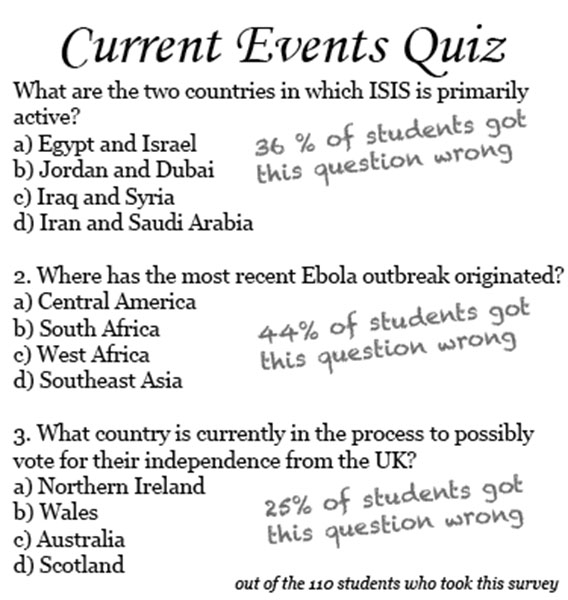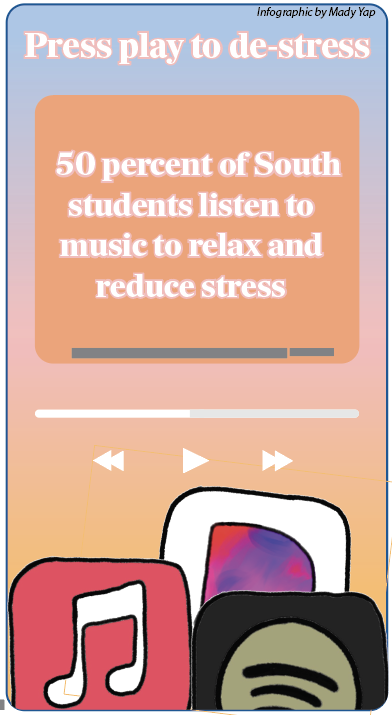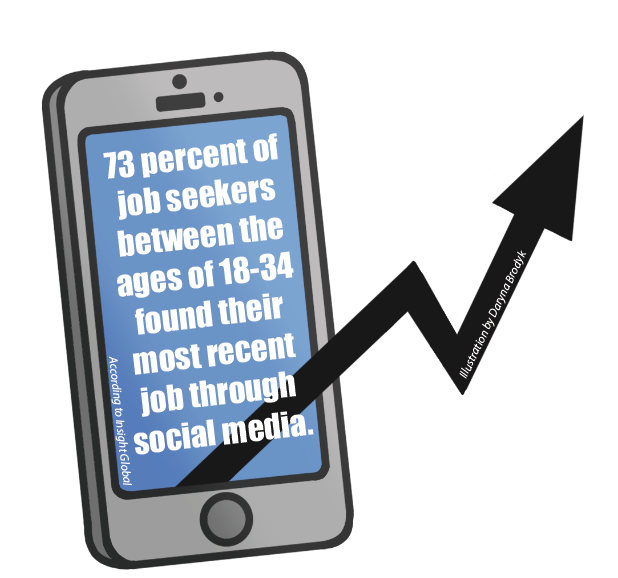Even though the outside world buzzes with activity and the state of important world affairs is constantly fluctuating, many students are lacking this up-to-date part of their education inside the walls of South. Although we understand that South is not the only school that struggles with this current events education, the Oracle Editorial Board encourages teachers to incorporate current events into their curriculum more consistently. However, we also encourage students to educate themselves on current events as much as possible.
The typical South student’s education comprises of a variety of topics, from history to foreign language to math, that aim to give students a comprehensive skill set. However, it has come to our attention that the instruction on how to apply these topics to what is presently going on in the news is largely absent from the South curriculum.
In an Oracle-conducted quiz on current events of 110 juniors and seniors, we were dismayed to discover how many South students did not know about important news topics. Some noteworthy results can be seen to the right.
Terry Jozwik, Social Studies Department instructional supervisor, believes in the importance of being knowledgeable about current events.
“It’s important to know what’s going on in the world,” Jozwik said. “…Having the ability to converse intelligently about what’s going on in the world is an important part of being a citizen, not only of the United States, but of the world.”
Although many students are not aware of or do not understand important political and social issues of the day, every student will be able to vote sometime during or after their senior year. Being a responsible citizen means having an adequate knowledge of current events, from the local to international levels, so you can make an educated vote.
Students:
Students should be exposed to current events in a school environment, as they are with all other academic subjects. However, the ultimate responsibility to stay informed on current issues falls upon the student. Because we’re all going to be eligible to vote relatively soon, this responsibility is important.
With social media, it’s faster than ever to access breaking news events. Follow news stations like CNN, NBC, Associated Press or The New York Times on Facebook or Twitter, or download an app on your phone that will send you short notifications when something noteworthy occurs. Talk about current events with your parents to get a new take on what you’ve read about, and enjoy being informed as it quickly turns into a habit.
Teachers:
The Oracle Editorial Board believes that all teachers should be able to connect their curriculum to current events in order to show the pertinence of what their students are learning. In addition to the knowledge of currents being necessary to be an informed voter, current events are a vital and helpful tool in education. What students are taught becomes more relevant when material is connected to topics that we have heard about recently.
We understand that teachers want to educate their students in the most thorough method possible, but a lack of time often forces teachers to streamline their curriculum. However, there are some South teachers that already frequently find time to include current events in their lesson plan. Stacy Flannery, US History and Eastern Religions teacher, recognizes the necessity and possibility of integrating current events.
“In US history […] we’re studying the Constitution, so one of the first things I’m going to do when we study Article II, which is the Executive Branch, is I’m going to show them the address that President Obama gave to the nation when he talked about what he wanted to do about ISIS,” Flannery said. “Then I’m going to use it to talk about the power in Article II that gives the president the ability to use airstrikes against ISIS in the Middle East.”
Although Flannery may not cover as much information about the different sections of the Constitution in that particular class period, her students will better remember the section she does go over because she is relating it to relevant issues. Ultimately, the goal of education should be to teach in terms of quality, not simply the amount of information taught.
Nine minute passing periods also offer an opportunity for current events to be incorporated into the classroom. This would be an opportune time for teachers to play a five minute or less news segment to show their students the topics of the day.
We hope that students would become interested in the news they are learning about and would want to discuss it further in class, but teachers with a full lesson plan can limit discussion but should allow enough to probe students’ thinking. The point of educating students on current events is to give them the tools they need to seek out more information on their own time.
However, with so many news sources available, students can be confused as to where to find information on current events. One simple way that teachers can set their students on the right track is by exposing them to reputable news sources with less political bias, such as NPR or BBC. Such news stations could even be put on in the Student Activities Center (SAC).
With all of our other required homework, students often don’t have time to fully read into the news they discover. Because our focus is pulled in so many directions in high school, it is the job of the teacher to incite an interest in their students an interest in understanding the world around them and how best to go about doing so.













